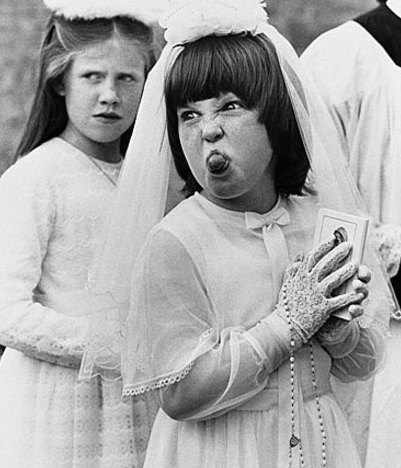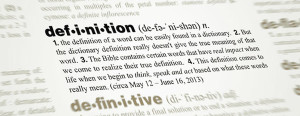Arguing with Catholics
 I recently had a discussion about the Faith with someone who was a former Catholic. After making several (factually incorrect) assertions about Catholic belief, she said something like this:
I recently had a discussion about the Faith with someone who was a former Catholic. After making several (factually incorrect) assertions about Catholic belief, she said something like this:
“Look, I know what I’m talking about. I was brought up Catholic. I was baptized, received my First Communion and was Confirmed. I went to Mass every Sunday….every Sunday! Not only that, I was in Catholic education for all high school…all of high school. Trust me, I know Catholicism…”
Now, I know my friend thought she was presenting me with some particularly impressive Catholic credentials, but I have to admit that (at least internally) I was smirking a bit as I heard all this…
That don’t impress me much
I do wish people wouldn’t say stuff like this. You see, I’ve heard it many times and it has yet to impress me. I’ve heard similar things from both converts to other Christian denominations and also from those who have left Christianity all together.
I’m not impressed because I too was brought up Catholic, received my First Holy Communion, was Confirmed, went to Mass every Sunday and was in Catholic education for the vast majority of my schooling…and I didn’t have a clue. I think my formation was probably better than most (primarily thanks to my mother) but I recognize that my faith formation was significantly lacking. I couldn’t have defined the Immaculate Conception or explained Papal Infallibility to save my life…
So are these “credentials” really that impressive? Let’s take a look at them each in turn…
1. Received the Sacraments?
Too many Catholics have been sacramentalized but not evangelized. Don’t get me wrong, reception of the Sacraments of Initiation is a wonderful thing, but they should be received with faith and, once they have been received, the grace found there needs to be nurtured in both the nuclear family and parish. If that support isn’t there it’s unlikely that person’s faith will flourish.
2. Went to weekly Mass?
Going to the liturgy every Sunday is also a beautiful thing, but I think we can all agree that the Mass experience is often rather lacking. I know from experience that it’s very easy to attend Sunday Mass with little or no impact upon the life of the attendee. This is particularly likely when the church is ugly, the liturgy banal and the preaching dull. It is also all too easy for the person to simply attend the liturgy yet be a stranger to those with whom he shares a pew, speaking to no one and failing to get involved in the life of the parish.
3. Received Catholic Education?
What about being in Catholic education throughout high school? I speak as someone who went to apparently one of the better schools, and all I can say is: what a joke! My Catholic schooling was incredibly lacking. The catechesis was incredibly poor, providing me with a little Scriptural or philosophical basis of my faith. There was a lot of talk about the “Catholic ethos” of the school, but I experienced very little of that. It was only years later that my faith started to mature and become more substantive.

I taught a Confirmation class one year back in England. I was teaching teenagers from the local Catholic schools who had many of the above “credentials”. I was horrified at what I found, stunned at the lack of basic understanding of the Faith. There was ignorance of Sacraments, Scripture, … and I think there’s strong evidence to suggest that this wasn’t an isolated example.
The Response
So what do I say when I hear statements like the one at the top of this post? Well, typically I ask some questions… I ask the person to tell me about their faith journey hitherto and I ask questions about the formation they received. I do this for two reasons. Firstly, it helps me to connect with the person and helps me get to know more about with whom I’m speaking. Secondly, it allows me gently to demonstrate that perhaps a few years of Catholic education isn’t perhaps that impressive…
 For example, when I meet former Catholics who have joined a Protestant congregation, I typically ask them about the doctrines which they rejected and I ask them to explain what those doctrines mean. This is usually very revealing. It is at this point that I am often told (incorrectly) that Papal Infallibility means that Catholics believe that the Pope is sinless (false) and that every single thing he says is without error (also false).
For example, when I meet former Catholics who have joined a Protestant congregation, I typically ask them about the doctrines which they rejected and I ask them to explain what those doctrines mean. This is usually very revealing. It is at this point that I am often told (incorrectly) that Papal Infallibility means that Catholics believe that the Pope is sinless (false) and that every single thing he says is without error (also false).
 After they’ve defined the doctrines they rejected, I ask another extremely important question. I ask for the Catholic explanation and defense of that belief. I don’t ask why they think it’s wrong, I ask them for the Catholic justification. If their Catholic formation was as impressive as suggested, then this should be easy. In my experience, it’s extremely rare to hear a good explanation. When an explanation cannot be provided, it opens the door to explain in a constructive way why Catholics believe what they do.
After they’ve defined the doctrines they rejected, I ask another extremely important question. I ask for the Catholic explanation and defense of that belief. I don’t ask why they think it’s wrong, I ask them for the Catholic justification. If their Catholic formation was as impressive as suggested, then this should be easy. In my experience, it’s extremely rare to hear a good explanation. When an explanation cannot be provided, it opens the door to explain in a constructive way why Catholics believe what they do.
I do something similar when I speak to those who have left Christianity and Theism altogether. It’s also always a good question to ask what materials they’ve been consuming. Have they read Aquinas’ Five Ways? Pascal’s Wager? etc. or have they been restricting themselves to atheistic books, consuming a strict diet of Dawkins?
Closing Thought
However, I think there’s another “response” we desperately need to give: improved Christian catechesis. I think it’s safe to say that Catholic formation in the last several generations has been pretty terrible. Fortunately, I think there are some signs that the tide is turning and that youth and young adult formation programmes are finally improving. The death of dumbed-down Catholicism cannot come soon enough!
How do you respond when former Catholics present their “Catholic credentials”?
What do you think we can do to improve Faith Formation of Catholics?
I think we could create better faith formation by dismissing the need for credentials in Catholics who are practicing, as in how many forming courses they attend, when reaching out to embrace one another as a fellowship. Not everyone can make all of the meetings that people hold that relatively seem to be expected as a punch in their “holy card”. (Notice I did not capitalize holy due to its relative unholy nature to dismiss those who cannot attend.) For those who cannot attend but strive to live the faith are often the ones suffering for the faith entirely and thereby living closely to Jesus in sacrifice. I think it is important to acknowledge that those who believe, without the requirement of explanation, are just as important as those who are able to seek in an outward fashion through information.
Hey Ashley,
This post isn’t about having “credentials”, it’s about how little these “credentials” mean, particularly when someone is trying to use them in an attempt to establish himself as an authority on the Catholic Faith.
Thanks,
David.
Yes David. I understand completely. In fact, I highly relate to your point in the article and most certainly have encountered similar argumentative persons and were very frustrated and perhaps not as successful in relating to the conflict you described. I’m sure many people have encountered such, as most would like to justify leaving what they interpret to not have served them.
However, let me make clear MY point. While you were discussing the unimportance of credentials in someone who does not believe, there is the same point to be made in those who do believe. The amount of events one goes to or scriptural documents they can quote does not define what is written on their heart in faith, nor how they live it.
The article you wrote primarily discusses credentials, again in your argument, as a matter that does not define ones ability to argue against the Catholic Church. True. But to extend the topic it also is not a matter to which we should expect our fellow Catholics to prove in order to earn fellowship.
You asked how we could further improve the formation of Catholics? Extending our hands and hearts. I think I explained quite well in my earlier response.
It is a discussion worth having as I have seen it have great impacting ability on the very Catholics the Church so aims at attaining and preaches fellowship for..,.
Thanks,
Ashley
Pingback: Best Catholic Apologetics Articles of 2014 | DavidLGray.INFO